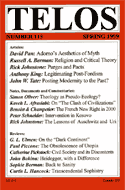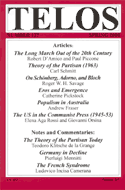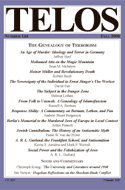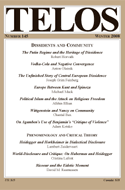By Etel Sverdlov · Tuesday, February 2, 2010 Each Tuesday in the TELOSscope blog, we reach back into the archives and highlight an article whose critical insights continue to illuminate our thinking and challenge our assumptions. Today, Etel Sverdlov looks at Rick Johnstone’s “Ethnic Purges and Neighborly Pacts: Reflections on a Swiss Statue,” from Telos 115 (Spring 1999).
 Optimism can never be overrated. It is simply too easy, when examining the world with a keen eye, to become lost within daily strife. For this reason, I found Rick Johnstone’s article “Ethnic Purges and Neighborly Pacts: Reflections on a Swiss Statue” particularly refreshing. Within his text, he traces the development and achievements of Switzerland, emphasizing the modesty of their political ambitions as one of the causes for their success. What saturates the article, however, more than anything, is a committed positive outlook concerning the Swiss. Johnstone glories in their pacifism and applauds them for their tolerance. When analyzing national policy, most people judge countries by what they have accomplished; Johnstone, on the other hand, steps through the looking glass and rejoices in what the Swiss have not done. And what they have not done is a lot. He points out with satisfaction the lack of war monuments to the fallen of World War I in Swiss villages: they had no desire to die by machine-gun fire in the muddy trenches. He emphasizes their invisibility on the political scene: “People jest that no one knows who is the President of Switzerland. . . . If no one knows who the President of Switzerland is, that is because it does not matter, and if it does not matter, that is not because Switzerland is not a success, but because it is, and because its success comes not from above, but from below.” He praises the most useless weapon of war, the Swiss Army Knife—a symbol, with its miniature corkscrew and scissors, of self-reliance and autonomy. Optimism can never be overrated. It is simply too easy, when examining the world with a keen eye, to become lost within daily strife. For this reason, I found Rick Johnstone’s article “Ethnic Purges and Neighborly Pacts: Reflections on a Swiss Statue” particularly refreshing. Within his text, he traces the development and achievements of Switzerland, emphasizing the modesty of their political ambitions as one of the causes for their success. What saturates the article, however, more than anything, is a committed positive outlook concerning the Swiss. Johnstone glories in their pacifism and applauds them for their tolerance. When analyzing national policy, most people judge countries by what they have accomplished; Johnstone, on the other hand, steps through the looking glass and rejoices in what the Swiss have not done. And what they have not done is a lot. He points out with satisfaction the lack of war monuments to the fallen of World War I in Swiss villages: they had no desire to die by machine-gun fire in the muddy trenches. He emphasizes their invisibility on the political scene: “People jest that no one knows who is the President of Switzerland. . . . If no one knows who the President of Switzerland is, that is because it does not matter, and if it does not matter, that is not because Switzerland is not a success, but because it is, and because its success comes not from above, but from below.” He praises the most useless weapon of war, the Swiss Army Knife—a symbol, with its miniature corkscrew and scissors, of self-reliance and autonomy.
Continue reading →
By Etel Sverdlov · Tuesday, November 24, 2009 Each Tuesday in the TELOSscope blog, we reach back into the archives and highlight an article whose critical insights continue to illuminate our thinking and challenge our assumptions. Today, Etel Sverdlov looks at Elena Aga Rossi and Giovanni Orsina’s article “The United States According to the Italian Communist Press (1945–1953),” from Telos 127 (Spring 2004).
 I wonder at times whether the Internet provides people around the world with greater access to the “truth.” Possibly as a result of the widespread availability of almost any information, propaganda today must become more subtle and broad generalizations, or even bold lies, more covert. Such distortions—some deliberate, some unintentional—once permeated Italian communist publications. In their article “The United States According to the Italian Communist Press (1945–1953),” Elena Aga Rossi and Giovanni Orsina trace the rhetoric with which the Italian communists attacked the United States. What stands out most within their analysis is the striking similarity between the charges that the communists and capitalists hurled at each other. I wonder at times whether the Internet provides people around the world with greater access to the “truth.” Possibly as a result of the widespread availability of almost any information, propaganda today must become more subtle and broad generalizations, or even bold lies, more covert. Such distortions—some deliberate, some unintentional—once permeated Italian communist publications. In their article “The United States According to the Italian Communist Press (1945–1953),” Elena Aga Rossi and Giovanni Orsina trace the rhetoric with which the Italian communists attacked the United States. What stands out most within their analysis is the striking similarity between the charges that the communists and capitalists hurled at each other.
Continue reading →
By Etel Sverdlov · Tuesday, October 20, 2009 Each Tuesday in the TELOSscope blog, we reach back into the archives and highlight an article whose critical insights continue to illuminate our thinking and challenge our assumptions. Today, Etel Sverdlov looks at Arden Pennell’s “Why Are They So Happy? Berlin’s Memorial to the Murdered Jews of Europe in Local Context,” from Telos 144 (Fall 2008).
 In all honesty, children playing under the shadow of the presidential statue in the Lincoln Memorial, sweethearts embracing behind the slabs of the World War II plaza, or families picnicking in the shade of the Vietnam Memorial, seem odd and incongruous. Monuments are rarely expected to act as recreational spaces. Rather, the heavy subject matter solemnified in each should lend to reflection and concentration. The opposite, however, is the case with the Berlin Memorial to the Murdered Jews of Europe, where the plaza filled with uniform rectangles of various heights provides visitors with a place to sunbathe, to cuddle, to play, to eat. In her article “Why Are They So Happy? Berlin’s Memorial to the Murdered Jews of Europe in Local Context,” from Telos 144 (Fall 2008), Arden Parnell examines the cultural history of the area in order to explain why the monument has been adopted and used with such unaccustomed cheerfulness. In all honesty, children playing under the shadow of the presidential statue in the Lincoln Memorial, sweethearts embracing behind the slabs of the World War II plaza, or families picnicking in the shade of the Vietnam Memorial, seem odd and incongruous. Monuments are rarely expected to act as recreational spaces. Rather, the heavy subject matter solemnified in each should lend to reflection and concentration. The opposite, however, is the case with the Berlin Memorial to the Murdered Jews of Europe, where the plaza filled with uniform rectangles of various heights provides visitors with a place to sunbathe, to cuddle, to play, to eat. In her article “Why Are They So Happy? Berlin’s Memorial to the Murdered Jews of Europe in Local Context,” from Telos 144 (Fall 2008), Arden Parnell examines the cultural history of the area in order to explain why the monument has been adopted and used with such unaccustomed cheerfulness.
Continue reading →
By Etel Sverdlov · Tuesday, September 8, 2009 Each Tuesday in the TELOSscope blog, we reach back into the archives and highlight an article whose critical insights continue to illuminate our thinking and challenge our assumptions. Today, Etel Sverdlov looks at Robert Hovarth’s “The Putin Regime and the Heritage of Dissidence” published in Telos 145 (Winter 2008), a special issue on “Dissidents and Community.”
 As the child of Russian immigrants who fled the Soviet Union just before it collapsed, I grew up in a unique time-warp. Not knowing the modern Russia, I was raised on Soviet songs, movies, and references. I thought it simply an amusing situation for a child to experience, but as Robert Horvath’s “The Putin Regime and the Heritage of Dissidence” makes clear, this sort of modern disconnect plays a strong, and damaging, part in contemporary Russian politics. Throughout the history of the Soviet Union, individuals of conviction found ways of subtly revolting against the oppressive Communist regime. Once that empire fell, however, these men began to feel the sting of obscurity. Sergei Kovalyov, “the most prominent former dissident in the State Duma,” Vladimir Voinovich, a Soviet satirist, and the most famous of the group, Alexander Solzhenitsyn, the long-bearded writer, all found themselves increasingly irrelevant in the new “democratic” Russia. The generation they belonged to had fallen away. As the child of Russian immigrants who fled the Soviet Union just before it collapsed, I grew up in a unique time-warp. Not knowing the modern Russia, I was raised on Soviet songs, movies, and references. I thought it simply an amusing situation for a child to experience, but as Robert Horvath’s “The Putin Regime and the Heritage of Dissidence” makes clear, this sort of modern disconnect plays a strong, and damaging, part in contemporary Russian politics. Throughout the history of the Soviet Union, individuals of conviction found ways of subtly revolting against the oppressive Communist regime. Once that empire fell, however, these men began to feel the sting of obscurity. Sergei Kovalyov, “the most prominent former dissident in the State Duma,” Vladimir Voinovich, a Soviet satirist, and the most famous of the group, Alexander Solzhenitsyn, the long-bearded writer, all found themselves increasingly irrelevant in the new “democratic” Russia. The generation they belonged to had fallen away.
Continue reading →
|
|
 Optimism can never be overrated. It is simply too easy, when examining the world with a keen eye, to become lost within daily strife. For this reason, I found Rick Johnstone’s article “Ethnic Purges and Neighborly Pacts: Reflections on a Swiss Statue” particularly refreshing. Within his text, he traces the development and achievements of Switzerland, emphasizing the modesty of their political ambitions as one of the causes for their success. What saturates the article, however, more than anything, is a committed positive outlook concerning the Swiss. Johnstone glories in their pacifism and applauds them for their tolerance. When analyzing national policy, most people judge countries by what they have accomplished; Johnstone, on the other hand, steps through the looking glass and rejoices in what the Swiss have not done. And what they have not done is a lot. He points out with satisfaction the lack of war monuments to the fallen of World War I in Swiss villages: they had no desire to die by machine-gun fire in the muddy trenches. He emphasizes their invisibility on the political scene: “People jest that no one knows who is the President of Switzerland. . . . If no one knows who the President of Switzerland is, that is because it does not matter, and if it does not matter, that is not because Switzerland is not a success, but because it is, and because its success comes not from above, but from below.” He praises the most useless weapon of war, the Swiss Army Knife—a symbol, with its miniature corkscrew and scissors, of self-reliance and autonomy.
Optimism can never be overrated. It is simply too easy, when examining the world with a keen eye, to become lost within daily strife. For this reason, I found Rick Johnstone’s article “Ethnic Purges and Neighborly Pacts: Reflections on a Swiss Statue” particularly refreshing. Within his text, he traces the development and achievements of Switzerland, emphasizing the modesty of their political ambitions as one of the causes for their success. What saturates the article, however, more than anything, is a committed positive outlook concerning the Swiss. Johnstone glories in their pacifism and applauds them for their tolerance. When analyzing national policy, most people judge countries by what they have accomplished; Johnstone, on the other hand, steps through the looking glass and rejoices in what the Swiss have not done. And what they have not done is a lot. He points out with satisfaction the lack of war monuments to the fallen of World War I in Swiss villages: they had no desire to die by machine-gun fire in the muddy trenches. He emphasizes their invisibility on the political scene: “People jest that no one knows who is the President of Switzerland. . . . If no one knows who the President of Switzerland is, that is because it does not matter, and if it does not matter, that is not because Switzerland is not a success, but because it is, and because its success comes not from above, but from below.” He praises the most useless weapon of war, the Swiss Army Knife—a symbol, with its miniature corkscrew and scissors, of self-reliance and autonomy.  I wonder at times whether the Internet provides people around the world with greater access to the “truth.” Possibly as a result of the widespread availability of almost any information, propaganda today must become more subtle and broad generalizations, or even bold lies, more covert. Such distortions—some deliberate, some unintentional—once permeated Italian communist publications. In their article
I wonder at times whether the Internet provides people around the world with greater access to the “truth.” Possibly as a result of the widespread availability of almost any information, propaganda today must become more subtle and broad generalizations, or even bold lies, more covert. Such distortions—some deliberate, some unintentional—once permeated Italian communist publications. In their article  In all honesty, children playing under the shadow of the presidential statue in the Lincoln Memorial, sweethearts embracing behind the slabs of the World War II plaza, or families picnicking in the shade of the Vietnam Memorial, seem odd and incongruous. Monuments are rarely expected to act as recreational spaces. Rather, the heavy subject matter solemnified in each should lend to reflection and concentration. The opposite, however, is the case with the Berlin Memorial to the Murdered Jews of Europe, where the plaza filled with uniform rectangles of various heights provides visitors with a place to sunbathe, to cuddle, to play, to eat. In her article
In all honesty, children playing under the shadow of the presidential statue in the Lincoln Memorial, sweethearts embracing behind the slabs of the World War II plaza, or families picnicking in the shade of the Vietnam Memorial, seem odd and incongruous. Monuments are rarely expected to act as recreational spaces. Rather, the heavy subject matter solemnified in each should lend to reflection and concentration. The opposite, however, is the case with the Berlin Memorial to the Murdered Jews of Europe, where the plaza filled with uniform rectangles of various heights provides visitors with a place to sunbathe, to cuddle, to play, to eat. In her article  As the child of Russian immigrants who fled the Soviet Union just before it collapsed, I grew up in a unique time-warp. Not knowing the modern Russia, I was raised on Soviet songs, movies, and references. I thought it simply an amusing situation for a child to experience, but as Robert Horvath’s “The Putin Regime and the Heritage of Dissidence” makes clear, this sort of modern disconnect plays a strong, and damaging, part in contemporary Russian politics. Throughout the history of the Soviet Union, individuals of conviction found ways of subtly revolting against the oppressive Communist regime. Once that empire fell, however, these men began to feel the sting of obscurity. Sergei Kovalyov, “the most prominent former dissident in the State Duma,” Vladimir Voinovich, a Soviet satirist, and the most famous of the group, Alexander Solzhenitsyn, the long-bearded writer, all found themselves increasingly irrelevant in the new “democratic” Russia. The generation they belonged to had fallen away.
As the child of Russian immigrants who fled the Soviet Union just before it collapsed, I grew up in a unique time-warp. Not knowing the modern Russia, I was raised on Soviet songs, movies, and references. I thought it simply an amusing situation for a child to experience, but as Robert Horvath’s “The Putin Regime and the Heritage of Dissidence” makes clear, this sort of modern disconnect plays a strong, and damaging, part in contemporary Russian politics. Throughout the history of the Soviet Union, individuals of conviction found ways of subtly revolting against the oppressive Communist regime. Once that empire fell, however, these men began to feel the sting of obscurity. Sergei Kovalyov, “the most prominent former dissident in the State Duma,” Vladimir Voinovich, a Soviet satirist, and the most famous of the group, Alexander Solzhenitsyn, the long-bearded writer, all found themselves increasingly irrelevant in the new “democratic” Russia. The generation they belonged to had fallen away. 

